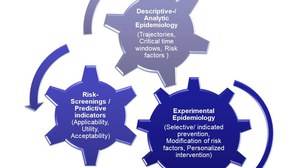Research at the Chair of Behavioural Epidemiology
The Chair of Behavioural Epidemiology focusses on psychological and behavioural factors, including cognitive-affective factors, in health and disease, considering interactions with genetic and social-environmental determinants.
 © Beesdo-Baum
© Beesdo-Baum
The thematic focus is on:
- Mental disorders as well as somatic diseases associated with psychological and behavioral factors
- Identification of symptom pathways as well as their critical trajectories
- Identification of risk- and protective factors
- Examine causalities within the scope of translational intervention studies (targeted prevention and early intervention)
- Identification of barriers for early intervention and therapies
Background
Mental and behavioural disorders and physical illnesses in which mental and behavioural factors play a significant role are a central challenge of the 21th century.
These conditions cause an enormous burden due to their high prevalence and their mostly chronic or episodic course.
Mental and behavioral disorders such as anxiety disorders, affective disorders and substance-related disorders often begin as early as in childhood, adolescence or young adulthood. Physical diseases such as diabetes mellitus, hypertension or musculoskeletal diseases usually develop for the first time in adulthood.
Mental and physical diseases frequently co-occur (comorbidity). This increases individual distress, impairments in lifestyle and work productivity, thus leading to tremendous economic and societal costs. The solution of the problem exclusively through therapeutic measures for people who are already suffering from the diease has not proven sufficiently promising because only a part of those affected is reached. Treatment is often carried out too late and is costly.
Against this background, there is urgent need to derive innovative preventive and early intervention measures that allow the modification of key risk factors and early symptom trajectories before the disorder manifests.
In our early recognition and intervention studies we "translate" findings from basic epidemiological research on risk factors and developmental stages into targeted early detection measures and intervention programs for high risk groups.
The long-term goal is the routine, population-based identification of risk groups and the targeted modification of risk factors in order to reduce the incidence of mental and behavioural disorders as well as associated physical diseases.




